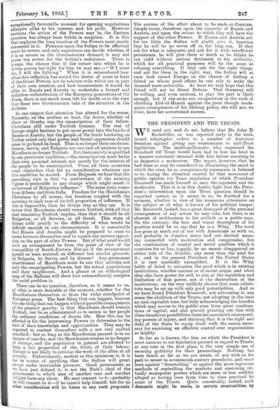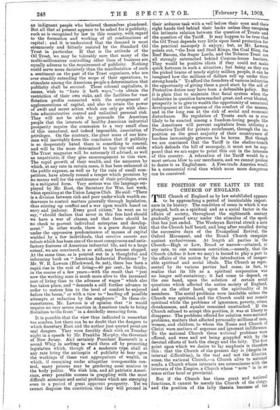THE PRESIDENT AND THE TRUSTS.
WE need not, and do not, believe that Mr. John D. Rockefeller, as was reported early in the week, issued telegraphic orders to a number of American Senators against giving any countenance to anti-Trust legislation. The multi-millionaire who organised the Standard Oil Trust would have had to lose his head in a manner extremely unusual with him before resorting to so desperate a manceuvre. The report, however, that he had done so may be considered as illustrating the mood in which the class he so conspicuously represents is believed to be facing the situation created by that movement of public opinion for Trust regulation of which President Roosevelt has made himself at once the exponent and the moderator. That it is in this double light that the Presi- dent's intervention upon the Trust question should be regarded cannot, as it seems to us, be doubted for a moment, whether in view of his numerous utterances on the subject or of what is known of his political temper. Mr. Roosevelt, indeed, has a great disregard of the personal consequences of any action he may take, but there is no element of recklessness in his outlook as a public man. On the contrary, the best and truest description of his position would be to say that he is a Whig. The word has gone as much out of use with Americans as with us, and probably in America never had our derived mean- ing connected with moderation and compromise, but the combination of mental and moral qualities which it connotes for us has, happily, by no means disappeared on either side of the Atlantic, any more than the need for it ; and in the present President of the United States it is very markedly exemplified. It is the Whig habit of mind to recognise the good which is in existing institutions, whether ancient or of recent origin, and when they also have power for evil, to aim at the regulation and limitation of that power, not at the destruction of the institutions, on the very unlikely chance that some substi- tute may be set up with only good potentialities. And so we have found President Roosevelt, not advocating in any sense the abolition of the Trusts, not adopting in the least an anti-capitalist tone, but fully acknowledging the benefits which may accrue to the public even from great combina- tions of capital, and also gravely pointing out that with these beneficent possibilities there are associated correspond- ing powers of injury, and claiming that it is the right and duty of the State to equip itself with the means neces- sary for exercising an effective control over organisations so mighty.
So far as is known, the line on which the President is most anxious to see legislation proceed in regard to Trusts, at any rate in the first place, is the very simple one of securing publicity for their proceedings. Nothing has been heard, so far as we are aware, of any wish on his part to revert to seventeenth-century precedents, and enact laws against "forestalling," or against the more ingenious methods of controlling the markets and exercising vir- tually monopolist powers which are more or less credibly alleged as having been from time to time practised by some of the Trusts. Quite conceivably, indeed, such demands might be made, in certain eventualities, by an indignant people who believed themselves plundered. But all that at present appears to be asked for is publicity, such as is recognised by law in this country, with regard to the formation and working of all combinations of capital ; and it isainderstood that the demand is most strenuously and -bitterly resisted by the Standard Oil Trust in particular. If that is the attitude of the Oil Trust, we may be tolerably sure that many of the multi-millionaires controlling other lines of business are equally adverse to the requirement of publicity. Nothing could serve more decisively than the manifestation of such a sentiment on the part of the Trust organisers, who are ever steadily extending the scope of their operations, to stimulate among the American people a, determination that publicity shall be secured. These colossal capitalists, it seems, wish • to "have it both ways,"—to obtain the restriction of their own risks, and the facilities for vast flotation profits connected with the arrangement of agglomerations of capital, and also to retain the power of swift and secret action which can only go with abso- lute administrative control and unlimited personal risk. They will not be able . to persuade the American people that the interests of healthy American industrial prosperity require the concession to a very small class of this unnatural, and indeed impossible, association of privileges. On the contrary, the great mass of our kins- men will inevitably form the conclusion that- if publicity is so desperately hated there is something to conceal, and will be the more determined to tear the veil aside. The Trust magnates will be extremely ill advised, as well as -unpatriotic, if they give encouragement to this view. The rapid growth of their wealth, and the measures by which, at any rate in certain, cases, it has been enhanced at the public expense, as well as by the ruin of small com- petitors, have already roused a temper which promises by no means well for the continuance of their privileges, even in a mitigated form. Very serious was the language em- ployed by Mr. Root, the Secretary for War, last week, when speaking at the Union League Club. He said: "There is a division between rich and poor under which wealth en- deavours to control matters generally through legislation, thus stirring up conflict and a war upon wealth based on envy and jealousy. Every good citizen," he went on to say, "should declare that never in this free land should we have a war of classes, and that there should be no check to prevent individual enterprise and develop- ment.'.' In other words, there is a grave danger that under the oppressive predominance of masses of capital wielded by a few individuals, that earriere ouverte aux talents which has been one of the most conspicuous and satis- factory features of American industrial life, and to a large extent, we are convinced, is so still, may become clogged. At the same time, as is pointed out in a thoughtful and informing book on "American Industrial Problems" by Mr. W. R. Lawson (Blackwood, 6s. net), there has been a rapid rise in the cost of living-40 per cent., he thinks, in the course of a few years—with the result that "just now the working man is much more alive to the increased cost of- living than to the advance of wages" which also has taken place, and "demands a still further advance in order to restore him to the level of comfort he enjoyed before the boom," or with a view to "heading off possible attempts at reduction by the employers." In these cir- cumstances, Mr. Lawson is of opinion that "it would require no very severe reaction in American trade to bring Socialism to the front" in a decidedly menacing form.
It is possible that the view thus indicated is somewhat too sombre, but there can be no doubt that the dangers to which Secretary Root and the author just quoted point are real dangers. They were forcibly dealt with on Tuesday night in a speech by Mr. Franklin Murphy, the Governor of New Jersey. And certainly President Roosevelt is a sound. Whig in seeking to ward them off by promoting legislation which, though of a moderate type. shall at any rate bring the antiseptic of publicity to bear upon the workings of these vast aggregations of wealth, in which, if remaining under altogether irresponsible con- trol, many poisons may be gendering most noxious to the body politic. We wish him, and all patriotic Ameri- cans, every possible success in grappling with the most difficult economic and social problems which are emergine, even in a period of great apparent prosperity. Yet we cannot disguise the conviction that they will proceed in. their arduous task with a veil before their eyes and their right hands tied behind their backs unless they recognise the intimate relation between the question of Trusts aaa the question of the Tariff. It may happen to be true that the Oil Trust depends very little upon fiscal protection for the practical monopoly it enjoys ; but, as• Mr. Lawson ints out, "the Iron and Steel Kings, the Coal Ring, the f Barons, the Sugar Lords, and the Tobacco Trust are all strongly entrenched behind Custom-house barriers. They would be positive idiots if they could not make quick fortunes in such a situation ; but being as they are the picked brains of nearly eighty million people, it can be imagined how the millions of dollars roll up under their strong hands." To afford the founders of various industries the opportunity of giving them a good start by the aid of Protective duties may have been a defensible policy. But it is plain that to maintain that fiscal system when the industries in question have reached great, and even bloated, prosperity is to give to wealth the opportunity of unnatural development at the expense of the comfort of the masses, and in the long run at the risk of social and economic disturbance. No regulation of Trusts such as is ever likely to be enacted among a freedom-loving people like the Americans will prevent capitalists from utilising a Protective Tariff for private enrichment, through the im- position on the great majority of their countrymen of burdens increasingly grievous to be borne. But though we are convinced that the Tariff is the shelter-trench which defends the hill of monopoly, it must not be sup- posed that we are eager to point this out in the interests of this country. A relaxation of the Tariff would be a most serious blow to our merchants, and we cannot profess to desire it as Englishmen. A Free-trade America would be a commercial rival than which none more dangerous can be conceived.







































 Previous page
Previous page